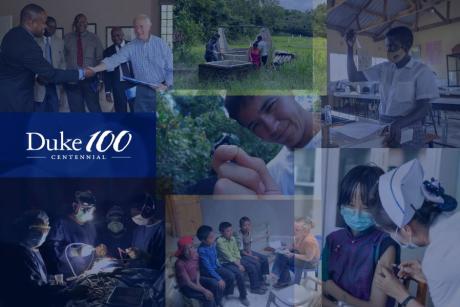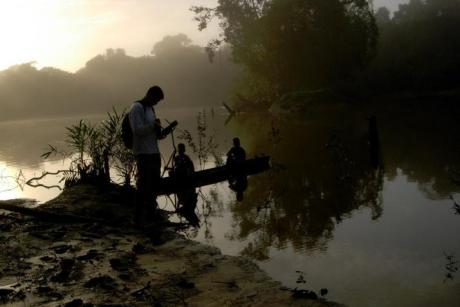Bass Connections leads students through Amazon
By Ray Li, Duke Chronicle
A Bass Connections initiative took Duke students and faculty through the Peruvian Amazon, where they researched the impact of mining and brought aid to the local communities.
The boat trip allowed the team to visit 15 river communities, where the three undergraduates and four graduate and professional students studied the impact of heavy metal contamination and emerging infectious diseases in the area.
“My personal belief is that gold mining is a devastating activity ecologically and can lead to significant long-term damage to people and societies,” Pan said.
Ernesto Ortiz, associate researcher at the Duke Global Health Institute and in-country trip coordinator, noted that a major concern was the contamination of the Amazon with mercury. The removal of huge amounts of soil due to large-scale mining allows mercury to leak into the soil and waters, effectively poisoning flora and fauna.
While conducting their research, the students noticed that the rapid expansion of shanty-towns around Puerto Maldonado, a prominent city near the Amazon, also has a negative health impact on the community.
This type of expansion can lead to an increased risk of infectious diseases due to crowding and decreased living conditions, Pan said. He noted that these socioeconomic changes will be the focus of study in further rounds of data collection.
Ortiz said those on the trip went above and beyond their research requirements to assist the local community members. He cited a specific example when he was asked to provide medical assistance to a local woman four hours down the river.
“She looked like she was 40 weeks pregnant. Her legs were swollen and she could barely breathe,” Ortiz said. “She was waiting to die in this small community—and she would have, had there been no intervention.”
Ortiz eventually discovered that the woman had an ovarian cyst, and radioed the Peruvian Navy. The navy then contacted the Ministry of Health to airlift the woman to a nearby medical center.
The students and faculty assisted the local community in less extreme conditions as well.
After noticing severe oral hygiene deficiencies in children of the region, the team partnered with a Peruvian dental company to provide toothpaste and dental care products for hundreds of local children, Pan said. Together, they established an extensive dental health education program that they then implemented in each community they visited.
This trip was one of the first projects of the Bass Connections program.
Pan noted that a key part of the trip was its integration of students from different academic levels, which was facilitated by the Bass Connections program.
“Admittedly… I was reticent to engage undergrads in my research for a number of reasons. But this team we developed, from undergrad to Ph.D., was truly remarkable,” Pan wrote in an email Saturday. “They evolved into a very effective research team and successfully collected all the data we had set out to obtain.”
Bass connections is a university-wide interdisciplinary initiative that began this year, giving Duke students the opportunity to solve problems in specific pathways and work in teams



